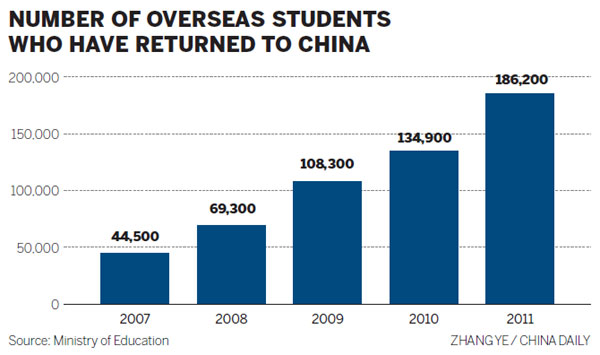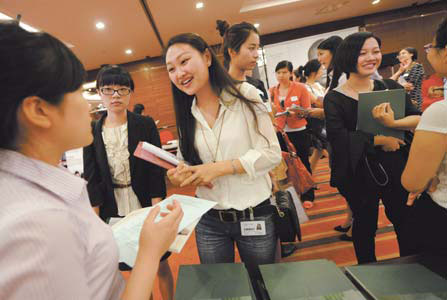Career growth tied to job after school
Updated: 2013-02-20 07:14
By Jin Zhu and Wang Qian (China Daily)
|
||||||||
|
Overseas returnees attend a job fair in September in Beijing organized by the London School of Economics and Political Science. Mark Ralston / for China Daily |
Among overseas returnees, those employed by multinational or foreign companies and those who start their own businesses enjoy better career development in China, according to analysts.
Thanks to the country's rapid development, demand for such returnees from multinational and foreign companies has grown in recent years.
Many people who have returned are now senior executives in these companies, said Wang Huiyao, director-general of the Center for China and Globalization in Beijing.
Wang's conclusion is based on the results of a report conducted by his research team in 2012.
More than 25 percent of overseas returnees have set up their own businesses in China, and another 42 percent said they plan to establish businesses, according to the report. It surveyed 499 people of different ages and most had studied or worked in the United States or Europe.
Those returning who start their own businesses mainly focus on high-tech industries such as electronic information technology and biotechnology, said Wang, citing the report.
Developed cities and regions, such as Guangdong, Zhejiang, Beijing and Shanghai, are favorite destinations for these returnees to start their own businesses, the report said.
In 2011, around 186,200 overseas students returned to China, a 38 percent year-on-year increase, according to the Ministry of Education. Most were encouraged to return mainly because they have family relations in China, and because of the nation's supportive policies and culture, which they are familiar with, said Wang.
But the social environment, mainly characterized by human relationships and restrictions on hukou, or household registration, is a key obstacle to some overseas students returning to the country, he said.
Liu Junshu, a 29-year-old from Shenyang, Liaoning province, who has studied in the UK since 2003, said: "If there is a good job opportunity, I would prefer to go back to China, because my parents and friends are all there, China's economy is developing rapidly and becoming internationalized." She studied at the University of Sussex, majoring in pharmaceutical science, and later studied at the University of Brighton for her master's degree in pharmacy.
Her academic achievements can help her earn at least 400,000 yuan ($63,500) a year in Britain after graduation, but in China the salary may be much lower.
"As far as I know, the monthly salary involving pharmacy work in China is less than 20 percent of my expectation," Liu said, adding that prices in China, especially for property, are rising too fast.
Housing prices in Beijing, Liu's preferred city for work in China, rose 2.27 percent in January, reaching 25,075 yuan per square meter, which means an 80 square meter house outside the downtown area will cost at least 2 million yuan.
Soaring prices are not the only deterrent; the guanxi, or network of contacts, which generally exists in the Chinese working environment, also worries Liu.
Although she would prefer to return to China, she hasn't made a decision yet, with so many concerns.
Wang said the country will continue to see a rising number of overseas returnees.
"Besides current supportive policies for top talent, such as subsidies, research allowances, favorable salaries and residency permits, government authorities should give more consideration to those overseas returnees with grassroots work," he said.
"For instance, China now encourages domestic master's and doctoral students to take temporary posts in the country's western regions to enrich their work experience. But such a supportive policy has not been introduced for overseas students," he said.
Contact the writers at jinzhu@chinadaily.com.cn and wangqian@chinadaily.com.cn

(China Daily 02/20/2013 page3)

 In Photos: 7.0-magnitude quake hits Sichuan
In Photos: 7.0-magnitude quake hits Sichuan
 Li Na on Time cover, makes influential 100 list
Li Na on Time cover, makes influential 100 list
 FBI releases photos of 2 Boston bombings suspects
FBI releases photos of 2 Boston bombings suspects
 World's wackiest hairstyles
World's wackiest hairstyles
 Sandstorms strike Northwest China
Sandstorms strike Northwest China
 Never-seen photos of Madonna on display
Never-seen photos of Madonna on display
 H7N9 outbreak linked to waterfowl migration
H7N9 outbreak linked to waterfowl migration
 Dozens feared dead in Texas plant blast
Dozens feared dead in Texas plant blast
Most Viewed
Editor's Picks

|

|

|

|

|

|
Today's Top News
Live report: 7.0-magnitude quake hits Sichuan, heavy casualties feared
Boston suspect cornered on boat
Cross-talk artist helps to spread the word
'Green' awareness levels drop in Beijing
Palace Museum spruces up
First couple on Time's list of most influential
H7N9 flu transmission studied
Trading channels 'need to broaden'
US Weekly

|

|








